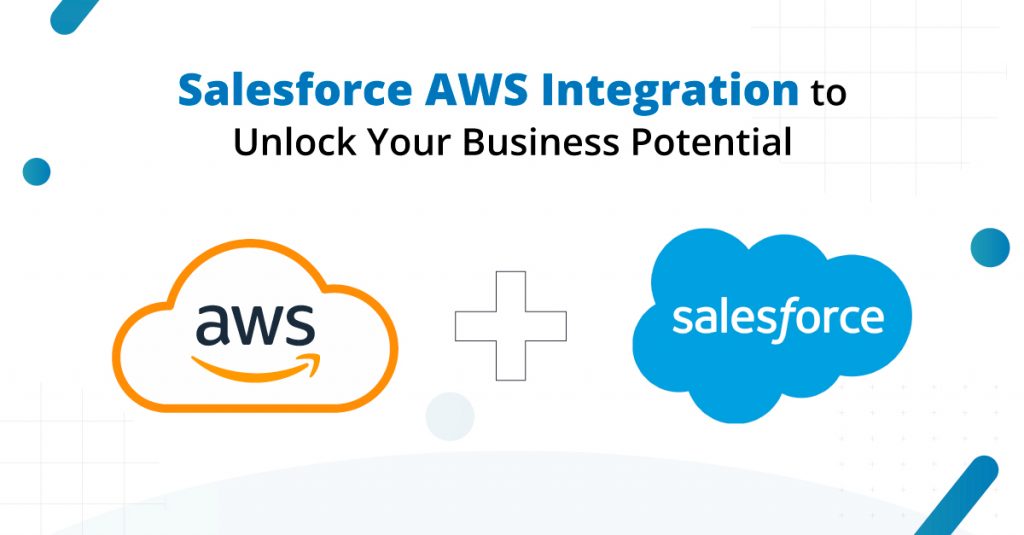Are you running a business? If yes, then you surely will be seeking ways that could help to streamline operations, achieve better customer understanding so that the team can respond to customer needs more effectively. If you can align yourself here, Salesforce and AWS are the most suitable platforms to achieve the improvement you seek. Sadly, not many firms realize what they can actually achieve with Salesforce AWS integration and how it could be valuable for the business.
The integration of both Salesforce and AWS is about creating a unified platform that could help businesses achieve better customer satisfaction and productivity with the combined power of both platforms.
In this blog, we’re going to look at Salesforce AWS integration more closely and understand what advantages it can offer to firms.
Why Businesses Should Consider Salesforce AWS Integration
The integration between Salesforce and AWS can be a doorway to enhanced productivity. Here are some more ways through which the integration will be valuable.
1. Improve Customer Experiences
By unifying Salesforce’s customer data with AWS’s AI/ML services, companies can personalize customer interactions and run personalized campaigns for better results. Predictive analytics, customer segmentation, and behavior-based recommendations are just a few examples of how this integration can elevate customer satisfaction and loyalty.
2. Work with Data Analytics
AWS supports some powerful tools for analytics through which businesses can analyze large volumes of Salesforce data. This can help them to discover new trends and make decisions after evaluating their data. Salesforce integration with AWS would enable companies to access and visualize data insights that may not be accessible while working with only Salesforce.
3. Cost Efficient
The AWS integration with Salesforce can help businesses with resourcing optimization. This would help them to cut costs associated with data processing and storage. AWS offers a flexible payment model through which teams can have the flexibility to use resources as needed.
4. Data Security & Compliance
The integration would enable teams to work with advanced security features such as encryption and Identity and Access Management (IAM). This helps to ensure that customer data remains secure and compliant with industry regulations. Businesses can trust that their data is completely safe and risk-free.
5. Streamline Operations
AWS’s compute power and Salesforce’s CRM functionalities combine to automate workflows, reducing manual tasks. For instance, AWS can help with the automation of data processing tasks, while Salesforce workflows ensure smooth customer journey management. Having streamlined tasks will make it easier for teams to handle work and focus more on strategies instead of other repetitive tasks.
Best Practices for Successful Salesforce and AWS Integration
Companies should follow some best practices that focus on planning and performance optimization to ensure a smooth and effective integration between Salesforce and AWS.
1. Plan Your Integration Objectives: You should outline what you want to achieve with the integration in the beginning only. This may include real-time analytics, automated workflows, or enhanced customer segmentation. Understanding your goals helps in selecting the appropriate AWS services and Salesforce functionalities that align with your business requirements.
2. Use AWS IAM for Secure Access Management: AWS supports Identity and Access Management (IAM) that helps to set up access permissions for data shared between integrated platforms. You can establish role-based permissions, limit access to sensitive data, and use MFA for ensuring even more security. Proper access management ensures that only authorized personnel are allowed to work with specific data and functions.
3. Monitor and Maintain Data Integrity: Data accuracy is essential, especially when integrating two powerful systems. Establish data governance policies to ensure that data within Salesforce and AWS remains consistent, clean, and up-to-date. This may include implementing regular data audits, validating data accuracy, and setting up automated error-handling protocols.
4. Prioritize Compliance and Regulatory Requirements: There are many industries like finance and healthcare that particularly emphasize on following compliance. So, it is necessary that your integration setup complies with data protection regulations (e.g., GDPR, HIPAA) by using AWS’s compliance tools and Salesforce’s data security features. This proactive approach can help avoid legal issues and protect customer trust.
5. Test and Optimize Regularly: Regular testing helps identify issues early and optimize performance. Continuously monitor the integration performance, analyze logs for anomalies, and adjust resource usage based on demand. Performance optimization can include scaling resources or enhancing data processing times based on customer needs and feedback.
Hire the Best Experts for Salesforce AWS Integration
This integration can be the true smart way for businesses for managing data effectively and making the most of it. By bringing together the strengths of both platforms, you’ll be able to streamline operations and work with data more efficiently.
All you need to have the support of just the right experts with you who understand both the platforms. Contact us and get the best certified professionals to help you with a successful integration.
